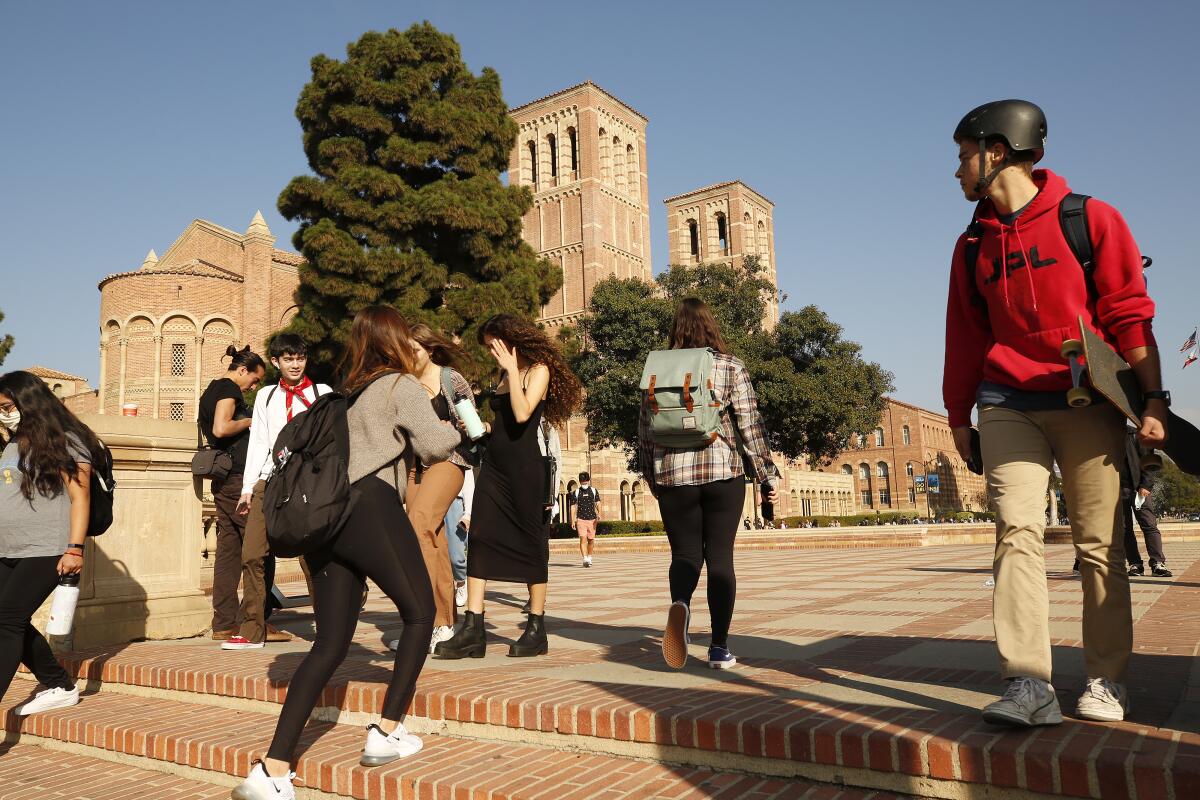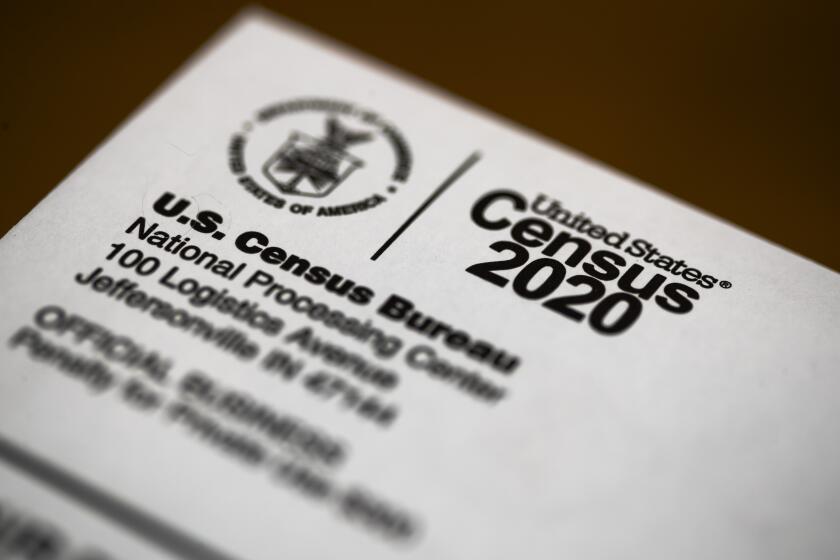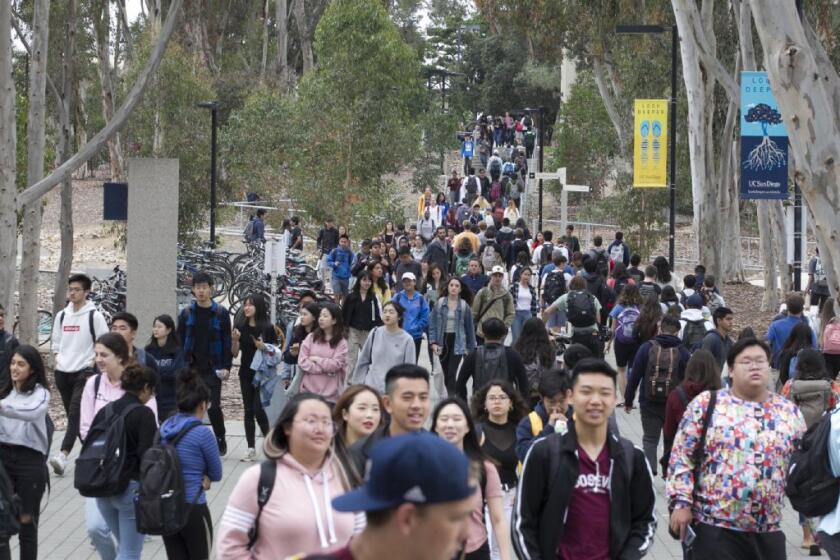Column: Elizabeth Warren knows how Democrats can win the midterms. It starts with canceling student loan debt

- Share via
Elizabeth Warren may have found the right-wing Achilles’ heel.
Sitting in the back patio of Los Angeles coffee shop Bricks and Scones, the Massachusetts senator described what she views as a main GOP vulnerability heading into November’s midterm elections. She wore a gray North Face jacket, her intense blue eyes periodically drifting to my notebook where I scribbled points.
“The Republicans have no ideas,” Warren told me. “They have no plans for how to make this a country that works better for anyone. No economic ideas, no ways to increase opportunity. Their well has run dry.”
Opinion Columnist
Jean Guerrero
Jean Guerrero is the author, most recently, of “Hatemonger: Stephen Miller, Donald Trump and the White Nationalist Agenda.”
Warren, a former Harvard law professor, is known for her plans. Her 2020 presidential campaign was dominated by her promoting paradigm-shifting, once-obscure ideas such as breaking up Big Tech. Before, she was instrumental in creating the Consumer Financial Protection Bureau. As Republicans fight culture wars, she believes Democrats can win if they ignore that bait and show they’re the party of plans that work.
That requires bold action. For example, President Biden should cancel federal student loan debt for tens of millions of Americans. It’s something Warren has been urging him to do, via phone call, tweet and more. She made time to discuss it with reporters while visiting family in L.A. “I am relentless,” she said with a chuckle. “It is the right thing, and I believe that we’ll make him receptive.”
On Tuesday, the U.S. Department of Education announced sweeping changes to existing public service loan forgiveness and other student loan programs plagued by administrative failures, saying 3.6 million borrowers would soon be closer to debt forgiveness and 40,000 people would get it immediately.
The number of Latino-majority districts in California has grown to 16 districts from 10. This could help Democrats retain control of the House.
Earlier this month, Biden further extended a pandemic-related pause on student loan payments to Aug. 31. White House Press Secretary Jen Psaki said the administration will take the time to “make a decision” about debt cancellation. Warren and other experts believe Biden can legally cancel student debt through executive action. More than $17 billion in debt has already been canceled since he took office.
About 45 million Americans collectively owe $1.6 trillion in student debt. Many can’t buy homes, start businesses or save for retirement. Some forego having children or getting married.
“Do you know the United States government is garnishing the Social Security checks of retirees who have not paid off their student loan debts?” Warren points out. “Or who, God bless ‘em, guaranteed a student loan debt for a beloved grandchild who has not been able to pay?”
Warren told me about a pregnant woman she encountered walking in Cambridge. The woman told her, “I have $120,000 in student loan debt. I only ever borrowed 40 [thousand]. But I fell behind. … I was sick and then my mother got sick.” In other words, Warren said: “Life happened.”
Warren went to the University of Houston when it was $50 a semester. “Five zero,” she said. Her father worked as a janitor and her mother answered telephones at Sears, but Warren could afford college as a part-time waitress. “That opportunity does not exist today,” Warren told me. “The idea that young people today should be shackled by debt just to try to get an education so they can try to compete is fundamentally wrong.”
Students who withdrew from college during COVID are still on the hook for Pell Grant funds their schools received. Sound crazy? That’s because it is.
Shackled is the word. An Afro-Puerto Rican friend of mine who asked for anonymity because of debt-related stigma told me she’s been trapped in a toxic job because of her student debt. “It’s like bondage,” she said.
Two-thirds of student debt is held by women; Black women are the most burdened. When running for Georgia governor in 2018, Stacey Abrams wrote an op-ed about the heavy student loans she had racked up. Not long after, Warren released a plan for canceling up to $50,000 in student loan debt per borrower.
“There is no single action the president can take all by himself that would have such a profound effect on racial justice in this country,” Warren told me.
Christopher Reeve, a 40-year-old Long Beach resident and Latino who takes care of his mother and owes more than $200,000 in student loans, is starting a food truck business, Mamey Mami, to sell savory arepas and other Miami street food. He’s been on survival mode so long that he has to take antidepressants. Although he’s disillusioned with Democrats, he told me debt cancellation would make him “more inclined to vote.”
A new poll from Data for Progress and Rise found debt cancellation would spur higher turnout in the battleground states of Arizona, Georgia, Pennsylvania and Wisconsin.
The debt isn’t exclusive to white-collar professionals. It weighs down electricians, plumbers, truck drivers. Cancellation “could have a positive impact on some Trump voters,” Kyra Taylor, a National Consumer Law Center staff attorney, told me. Former President Trump, who initiated the loan payment pause and extended it to 2021, knew it would be “catastrophic electorally” to retract it before the election, says Melissa Byrne, a political organizer and activist on debt cancellation.
Cancellation would benefit Americans across the political spectrum. Still, Republicans are attacking debt forgiveness as socialism, just as they characterized the American Rescue Plan, which helped broad swaths of society. Warren scoffed: “Public education is not socialism. It’s how we invest in the future. It’s no more socialism than roads and bridges. This is the infrastructure of running a country.”
Americans are realizing that sometimes, as Warren put it, life happens. We need a hand. “During the pandemic, people across this country started to see up close and personal why we need a functioning government,” she said. “We understood that we needed each other.”
She held my gaze, adding: “That’s a huge threat to the Republicans.”
Maybe it’s because I’m tired of the fire hose of bad news, but I believe Warren may be on to something — that the party that recognizes the reality of human interdependence and responds with real policies instead of viral vitriol could indeed emerge victorious.
More to Read
A cure for the common opinion
Get thought-provoking perspectives with our weekly newsletter.
You may occasionally receive promotional content from the Los Angeles Times.














